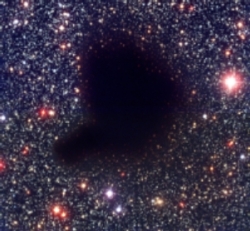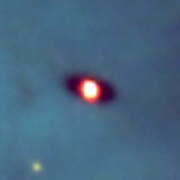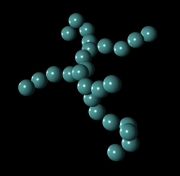The working group Planet Formation and small bodies in the Solar System deals on the one hand with the investigation of the conditions under which the astronomically observable small dust particles around young stars agglomerate into larger clumps. On the other hand, numerous small bodies in the Solar System are objects of research, whereby the small also includes moons.
In contrast to other working groups on this topic, experiments are carried out at the Institute for Geophysics and Extraterrestrial Physics to research the growth of solid bodies in young planetary systems. Some of these tests take place under microgravity conditions in the drop tower in Bremen or during parabolic flights.
An international test facility for studying the interactions between cosmic and atmospheric particles on the International Space Station ISS is currently being developed under the direction of the institute.
In the field of teaching, lectures on astrophysics and planetology are offered on a regular basis. In addition, the astrophysical internship - "Astroprak" for short - is offered. Master’s students are given a research task of current interest in which they carry out experiments in the laboratory or work with computer simulations in order to get to know research practice better.

Stars can form in dark clouds like the Bok globule Barnard 68 shown here. The dark shape and the shielding of the light from the stars behind it is done by a multitude of tiny dust particles, the physical properties of which are being investigated at the Institute for Geophysics and Extraterrestrial Physics.

With the Hubble Space Telescope, so-called protoplanetary disks were found in the constellation Orion. Our solar system was also formed in such a disk 4.6 billion years ago. Our working group deals with this process.

Reconstruction of a dust agglomerate generated during a space shuttle flight. In this microgravity experiment, a cloud of tiny particles was evenly distributed in a dilute gas. Brownian motion of the particles caused adhesive impacts, which led to the open structure shown. The beginning of the planet formation should proceed in the same way.
Comet Physics Laboratory (CoPhyLab)
Formation and evolution of dwarf planets and small bodies
Lunar regolith properties from the interpretation of surface temperatures
Blick zurück in frühe Stadien des Sonnensystems
nano - Planetengeburt im Labor
nano - "Kometen sind ein physikalisches Labor"
| Guest Scientists |
|---|
| Dr. Dr. h.c. Horst Uwe Keller |
| Noah Molinski |
| Christian Schuckart |
| Coskun Aktas |